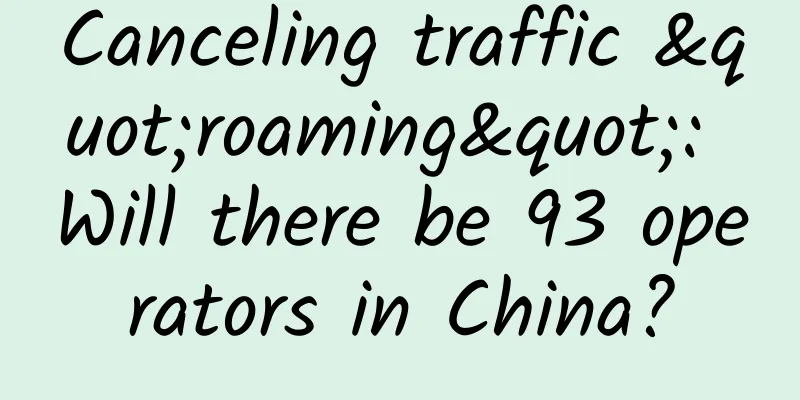Canceling traffic "roaming": Will there be 93 operators in China?

|
At the first session of the 13th National People's Congress on March 5, Premier Li Keqiang delivered a government work report. For the telecommunications industry, the report recommended increasing speed and reducing fees, canceling data roaming fees, and reducing mobile network data charges by at least 30% within the year. In response, the three major operators have stated that they will resolutely implement the national policy requirements of "speeding up and reducing fees", increase the speed and fee reduction efforts, cancel the data roaming fee, and reduce the mobile network data charges by at least 30% within the year. "Speeding up and reducing fees" has also become the focus of the three major operators' work this year.
The conditions for further speed increase and fee reduction are in place In fact, increasing speed and reducing fees are no longer new things for operators and consumers. Since 2015, the three major operators have repeatedly increased Internet speeds and lowered communication charges. It is understood that in terms of speed increase, the number of fiber-optic broadband users and mobile broadband users in my country ranked first in the world last year. Currently, the number of users using 50 Mbps broadband and above accounts for more than 70% of the total number of household broadband users, and the number of 4G users has approached 1 billion by the end of 2017. In terms of reducing fees, users' fees are constantly decreasing through measures such as increasing speed without raising prices, not clearing traffic, and canceling long-distance roaming charges for voice calls. Over the past three years, the unit price for broadband users has dropped by 90%, and the unit price for mobile communication users has dropped by 83.5%. In particular, in 2017, unlimited packages and Internet cards significantly reduced consumers' communication charges. For example, China Unicom, which launched low-priced packages such as the Ice Cream Package and Tencent King Card, gave a total profit of 3.83 billion yuan in 2017, including 960 million yuan for mobile communications and 2.87 billion yuan for broadband. The unit bandwidth fee fell by 65% year-on-year. Cancellation of roaming charges may lead to chaos among more than 90 branches The three operators have always adopted the group + branch model, and each branch has its own market scope. However, with the end of roaming fees this year, the market competition boundary established by roaming fees has been completely broken. Whichever local branch offers the cheapest tariff can attract users across the country to apply. Especially in the current market, the low-priced unlimited local data packages launched by local operators will undoubtedly significantly reduce the national data charges once the roaming restrictions are lifted. This is particularly attractive to users in high-cost areas such as Beijing, Shanghai and Guangzhou. It is not difficult to imagine that if the operators adopt effective measures to unify the national data tariff standards before canceling the data roaming charges, the competition situation of the three operators originally isolated in each place will turn into a melee among more than 90 branches of the three operators. Not only will the competition between China Mobile, China Unicom and China Telecom become more intense, but local operators in high-cost areas such as Beijing, Shanghai and Guangzhou will also face attacks from their own brothers in low-cost areas. The branch model may become a thing of the past Once the national tariff packages are unified and the services are consistent, the branch model that has been operating in the operator market for many years will become meaningless. In the early days of mobile network development, operators' provincial and municipal companies operated independently, and the network construction, maintenance, billing, and customer service systems of mobile services were all independently responsible by the provincial and municipal companies. However, after the large-scale construction of 3G and 4G, especially the operation of 4G, operators have an increasingly strong desire to unify and centralize management across the country and break down barriers between provinces. At the same time, with the cancellation of roaming charges, each branch will face competition from operators across the country. The three major operators certainly do not want to see internal friction caused by such a situation, and the branch model will inevitably change. National unified maintenance, billing, and customer service may become the operating model of operators in the future. This will also bring obvious benefits. All national business platforms will be connected, and operators can create a unified national backend and carry out centralized management. The tariffs can also be truly unified, simple and clear, and users will no longer have the embarrassment of difficult choices. |
<<: The future of the telecommunications industry – opportunities and challenges
>>: How long can Huawei's enterprise business maintain such high growth in performance?
Recommend
5 ways 5G will change the world
As communications technology goes, the switch fro...
How can operators easily get on the battlefield in the 5G era? 4.5G will take on the heavy responsibility
With the arrival of 5G, maintaining 2G, 3G, 4G, a...
5 Advantages of Edge Computing in Enterprise Network Strategy
Edge computing has quickly become popular for com...
DiyVM: 50 yuan/month - 2GB/50GB/10M/Hong Kong CN2/US CN2/Osaka, Japan optional
How about DiyVM? The Chinese host provider was es...
Why 5G won’t replace Wi-Fi 6 at the edge anytime soon
[[419672]] The shift to hybrid work and widely di...
Aruba Expands Instant On Portfolio to Support Business Continuity and Rapid Capability Expansion for SMBs
Recently, Aruba, a subsidiary of Hewlett Packard ...
Managing the Digital Experience with Riverbed SteelCentral
It’s the age of digital business. Two-thirds of c...
The biggest problem with 5G: not the technology, but the lack of “killer applications”
The global 5G progress forecast released by Credi...
Industry Observation: 6G will mainly become an industrial IoT network
Cellular positioning technology for key IoT indus...
SpectraIP: €3.5/month KVM-2GB/50GB/5TB/Netherlands data center
SpectraIP is a Dutch hosting company that provide...
Servmix: $1.03/first month - single core, 1G memory, 30G SSD, 1TB monthly traffic, German VPS
Servmix is a foreign hosting company founded in...
BandwagonHost: DC9 triple-network CN2 GIA line replenishment annual payment of US$74, 2.5-10Gbps bandwidth CN2 GIA quarterly payment starts at US$46.7
The DC9 triple-network CN2 GIA line host of Bandw...
An article that explains the HTTP protocol in Dubbo in detail
The sun is red, the flowers are colorful, hello r...
The large-scale replication of 5G private network applications urgently needs policy support
Since the license was issued on June 6, 2019, my ...
Qi Chao, Triangle Beast: How to eliminate machines’ misunderstanding of humans
[51CTO.com original article] On July 21-22, 2017,...









